

Emotional Intelligence - Dissertation Absracts. The following list of dissertations represent research conducted in the area of emotions and emotional intelligence in organizational settings with adult populations.
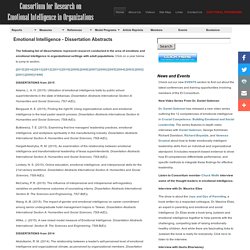
Click on a year below to jump to section. DISSERTATIONS from 2015 Adams, L. A. H. (2015). Bergquist, K. Butkiewicz, T. Hargett-Neshyba, R. Lindsey, N. McCarley, P. Wang, K. Wilke, J. (2015). DISSERTATIONS from 2014 Abdulkarim, R. Acha, V. (2014). Choosing a Dissertation Topic? Ask These 4 Questions. Searching for the perfect doctoral dissertation topic?
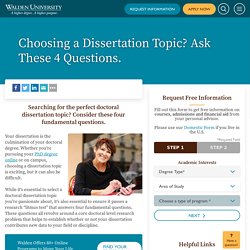
Consider these four fundamental questions. Your dissertation is the culmination of your doctoral degree. Whether you’re pursuing your PhD degree online or on campus, choosing a dissertation topic is exciting, but it can also be difficult. While it’s essential to select a doctoral dissertation topic you’re passionate about, it’s also essential to ensure it passes a research “litmus test” that answers four fundamental questions. These questions all revolve around a core doctoral-level research problem that helps to establish whether or not your dissertation contributes new data to your field or discipline. Walden Offers 80+ Online Programs to Move Your Life Forward, find your program now.
Question 1: Is your doctoral dissertation proposal justified?
Types of Research Designs. The function of a research design is to ensure that the evidence obtained enables you to effectively address the research problem logically and as unambiguously as possible.
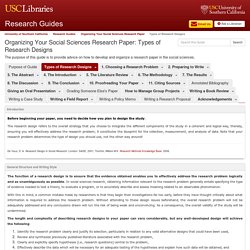
In social sciences research, obtaining information relevant to the research problem generally entails specifying the type of evidence needed to test a theory, to evaluate a program, or to accurately describe and assess meaning related to an observable phenomenon. With this in mind, a common mistake made by researchers is that they begin their investigations far too early, before they have thought critically about what information is required to address the research problem. Recognising research problems. Research Skills required by PhD students A1: The ability to recognise and validate problems Check this skill By the time students complete a PhD, they should be able to answer ‘Yes’ to most of these questions.
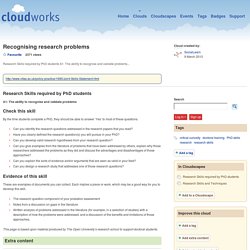
Can you identify the research questions addressed in the research papers that you read? Have you clearly defined the research question(s) you will pursue in your PhD? Evidence of this skill These are examples of documents you can collect.
Research-Methodology - Necessary knowledge to conduct a business research. Conversations That Change the World. The issue on the table was creating an energy market among a few neighboring countries.
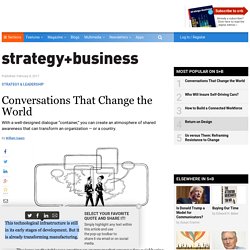
Energy exchanges allow utility companies to buy and sell electric power more freely, they spark commercial development, and they boost the economy of regions. Most parts of the world had relied on this type of exchange for years. It would seem like an easy, obvious move. But the year was 2011, the place was South Asia, and the proposed electricity links would cross the highly contested Punjab region linking India and Pakistan — two countries whose very identities were opposed to each other. Every evening the border closed. About 10 senior officials and former officials from both governments (and several other South Asian governments) were in the room. The seed for the meetings had been planted a few months earlier, at a leadership program convened by my firm.
One attendee asked, “Why doesn’t India sell power to Pakistan?” “Do we in this room really need to rehash the reasons for this?” Why Leaders Who Listen Achieve Breakthroughs. As a leader, communicating can sometimes feel like Groundhog Day.
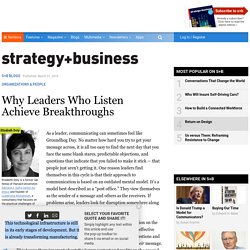
No matter how hard you try to get your message across, it is all too easy to find the next day that you face the same blank stares, predictable objections, and questions that indicate that you failed to make it stick — that people just aren’t getting it. One reason leaders find themselves in this cycle is that their approach to communication is based on an outdated mental model. It’s a model best described as a “post office.” They view themselves as the sender of a message and others as the receivers. If problems arise, leaders look for disruption somewhere along the route.
The post office model focuses most leaders’ attention on the sending process, rather than the give-and-take of effective conversations. The Mindful Board. In 1995, the board of directors of Methodist Hospital faced a profound decision over the institution’s future.
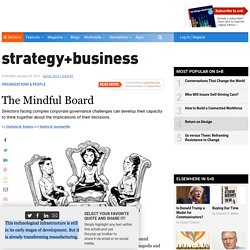
The hospital, based in Indianapolis and owned by the Methodist Church, had significant financial assets, but its patient numbers were declining. It was considering a business relationship with both Riley Hospital for Children and University Hospital, two local academic facilities managed by and for the School of Medicine of Indiana University. As state-owned institutions, they lacked the funds and patient population to support their own three-part mission: education, research, and patient care. Us versus Them: Reframing Resistance to Change. Anyone attempting to lead change in an organization knows to expect some resistance.
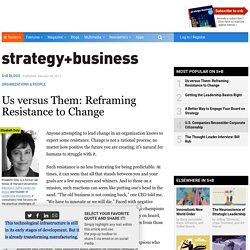
PQDT Open: Northcentral University Dissertations.